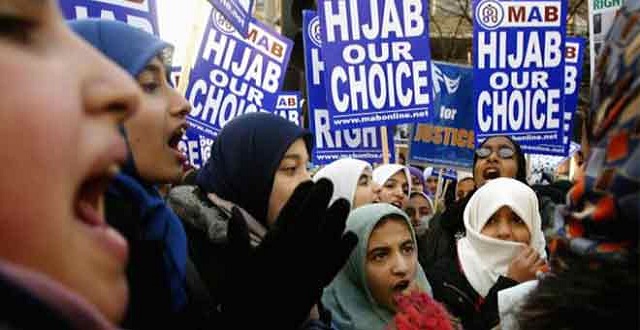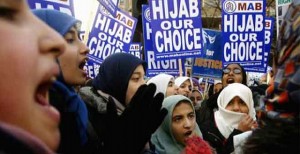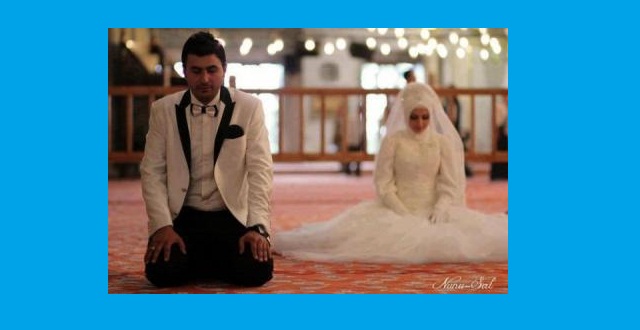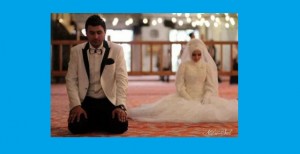What is the Philosophy of Hijab?
Undoubtedly, in this age of ours – which some have named as the ‘age of nudity and sexual freedom’ and in which, West-stricken individuals regard wantonness of women as being part of this freedom – the mention of Hijab is very disconcerting for this group of people and at times is even looked upon as a myth associated with the ancient times!
However, the innumerable evils and the ever-increasing problems arising out of this unconditioned freedom have gradually resulted in the concept of Hijab being viewed with a greater interest.
Of course, in the Islamic and religious environments – especially in Iran after the revolution – a great number of issues have been clarified and satisfactory answers to most of these questions have been provided. Nevertheless, the significance of the topic demands this issue to be discussed more comprehensively.
The issue under discussion is: Should women (with due apologies) be placed at the disposal of all men for the purpose of being exploited by them by way of sight, hearing and touch (excepting sexual intercourse), or should these benefits be the sole prerogative of their respective husbands?
The point of debate is about whether women should continue to remain entangled in a never-ending competition in flaunting their bodies and stirring up the physical and carnal desires of men, or whether these issues should be uprooted from the social environment and restricted to the familial and matrimonial milieu. Islam advocates the latter plan and Hijab can be looked upon as a part of this agenda, whereas the Westerners support the former plan!
Islam avers that all such physical pleasures – sexual intercourse as well as those derived by means of sight, hearing and touch – are specific to the husbands, and anything beyond this is a sin which leads to pollution and impurity within the society.
The philosophy behind Hijab is indeed evident since:
1. Nudity of women, which is quite naturally accompanied by adornment and coquettishness puts men, especially the youths, in a state of perpetual stimulation – a stimulation which affects their nerves, generates within them pathological nervous excitement and at times even brings about psychological disorders. There is a limit to the burden of excitement which the human nerves can endure. Don’t all the psychologists caution that perpetual excitement leads to disorders and diseases?
This is especially in view of the fact that the sexual impulse is the strongest and the most profound of all impulses within man and, all through the ages, has been the cause of destructive events and horrendous offences, to the extent that people have gone on to say: You shall not come across any important event (in history), except that a woman has played a part in it!
Is the continuous provocation of this impulse by means of nudity, and intensifying it, not tantamount to playing with fire? Is this act wise and prudent?
Islam desires that Muslim men and women should possess a soul that is calm, nerves that are composed, and eyes and ears that are pure, and this is one of the philosophies of Hijab.
2. Substantiated and conclusive statistics reveal that with the rise in nudity, the world has correspondingly witnessed a continuous rise in divorces and matrimonial separations. This is because “whatever the eyes see, the heart covets”; and whatever the heart (which here means the errant and wild desires) covets, it seeks to obtain it at any cost. Therefore, every new day the heart gets attracted to one and bids farewell to another.
In an environment where Hijab is prevalent (together with adherence to the other Islamic conditions), the husband and wife belong to each other and their sentiments, love and feelings are exclusively for one another.
But in the ‘free market of nudity’ wherein women have been practically transformed into a commodity of mutual use – (at least in issues other than sexual intercourse) – the sanctity of a matrimonial alliance becomes meaningless, and families, similar to a spider’s web, swiftly break apart and the children are left without guardians.
3. The increase in indecency and obscenity, and the escalation in the number of illegitimate children are the most painful consequences of non-observance of Hijab – a fact which, in our opinion, does not require any figures and statistics; and the reasons for this, especially in the Western society, are so very apparent so as to eliminate the need for any mention.
We do not say that non-observance of Hijab is the sole and fundamental cause of obscenities and illegitimate children, nor do we say that colonialism and destructive political issues have not had any contribution to it; rather, what we wish to state is that the issue of nudity and non-observance of Hijab is as one of the instrumental and effective factors for those evils.
In view of the fact that ‘indecency’, and worse than this, ‘illegitimate children’ were and are amongst the sources of various crimes in human societies, the dangerous dimension of this issue becomes all the more clear.
We perceive the gravity of the matter when we hear that, according to statistics,11 in the United Kingdom five hundred thousand illegitimate children are born every year and then when we hear that a group of British intellectuals has issued a warning to those in the echelons of power with respect to this ongoing trend. The warning is not motivated out of ethical or religious concerns but rather out of concern for the dangers these illegitimate children pose to the safety of the society, to the extent that their involvement is observed in numerous criminal dossiers.
We (also) come to realize that even those who possess scant respect for religion or ethical issues consider the issue of the spread of indecency to be catastrophic. Thus, everything that serves to increase the sphere of physical immorality in human societies is a threat for their security, and the consequences – in whatever manner we may compute them – shall always be to their detriment.
Studies by educated scholars reveal that reduction of work, backwardness and lack of responsibility are most noticeably perceived in schools, which are co-educational in nature and in centres where males and females work together in an ambience of licentiousness and complete freedom.
4. The issue of ‘obscenity of women’ and ‘humiliation of their personalities’ also holds great importance and requires no statistics to prove it. When a society desires a woman with a bare body, it is quite obvious that day by day, it would demand increased beautification and augmented ostentation from her. In a society wherein a woman, due to her physical attraction, is utilized for promotion and publicity of products, as a decoration for the reception rooms, or as a tool for attracting tourists, her personality is reduced to that of a doll or a trivial and insignificant item, and her lofty human values are totally thrust into oblivion; ultimately, her only distinction and glory lies in her youth, beauty and self-exhibition.
Thus, she is transformed into a device for satisfying the carnal desires of a handful of individuals, who are polluted, deceptive and possess satanic attributes!
In such a society, how is it possible for a woman to manifest herself in the light of her knowledge, awareness, sagacity and moral traits, and to occupy a lofty rank and status?
It is indeed painful that in the Western and West-stricken countries, and in our country (too) before the Islamic Revolution, the maximum prominence, fame, repute, money, income and standing had been for the polluted and promiscuous women, who had come to acquire renown as ‘artists and performers’. Wherever they went, the management of this polluted environment would scramble after them to welcome their presence!
Praise be to Allah that the entire apparatus was annihilated and the female sex emerged from her previous triteness or her erstwhile standing as a cultural doll and an insignificant item, and salvaged her personality. She took for herself the veil without being secluded and isolated, presenting herself in every expedient and constructive arena of the society – even the battlefield – with the same veil and Hijab.
Criticisms Levelled by the Opponents of Hijab
At this point we come to the objections which are levelled by those opposing the veil and which need to be discussed, albeit concisely:
1. The most important thing which all of them support in unanimity and which they propound as the fundamental objection with respect to the issue of Hijab is that women constitute one half of the society but the Hijab pushes this multitude into seclusion thereby causing them to lag behind culturally and intellectually. Especially during the period of economic thriving, when there is a greater need for active human participation, this large female force would remain totally unutilized in the path of economic progress, not to speak of their lack of presence in social and cultural centres. Thus, they are transformed into a mere consumer that is a burden for the society.
But those who have resorted to this logic have either been totally oblivious of certain points, or have probably feigned lack of knowledge about them:
Firstly: Who says that the Islamic Hijab isolates a woman and distances her from the social arena? If, in the past, it had been necessary for us to exhaust ourselves in order to present proofs and arguments in defence of this issue, now, after the Islamic Revolution, there does not exist the slightest need for them, for with our own eyes we observe groups of women, in the Islamic Hijab, presenting themselves in all places – in offices, workstations, political rallies and demonstrations, on the radio and television, in cultural and educational institutes, in hospitals and medical centres, especially for nursing those injured in war, and even in the battlefield against the enemies.
In short, the present state (of the Islamic society) is a fitting riposte to all these objections; if previously we spoke of the ‘possibility’ of such a state, today we find ourselves facing the ‘occurrence’ of it and philosophers have stated that the best proof for the ‘possibility (of occurrence)’ of a thing is the (actual) ‘occurrence’ of that thing, and this is something, which is too evident and manifest to require any explanation.
Secondly: Is managing the house, training and educating the youthful children and transforming them into individuals not a task? After all, through their strength and ability, the youths are able to set the gigantic wheels of the society into motion.
People who do not view this great mission of women positively are ill-informed of the role played by family and training in constructing a healthy, prosperous and dynamic society. They imagine that the (correct) manner is that our men and women, like those of the West should, at the first sign of daybreak, leave their houses for their places of work, either leaving their children in nurseries or locking them up in a room thereby making them taste the bitterness of imprisonment at a time when they are blooming buds.
They are totally oblivious of the fact that this approach not only shatters their personalities but also moulds them into soulless children, who are found to be lacking in human sentiments and affections, and who will eventually jeopardize the future of society.
Secondly: Another of their objections is that the Hijab is a cumbersome dress, which is not well suited for social activities, especially in the modern automobile age. What should a veiled woman look after – herself, her chador, her children or her work?
But these critics do not realise the fact that the Hijab does not always mean a chador, but rather it refers to a woman’s covering. If the Hijab is possible by means of the chador, so much the better, but if not, then a covering is quite sufficient.
The womenfolk of our country, who engage in farming and live in villages – especially those who work in the rice-fields and perform the most important and difficult work of cultivating and harvesting the crop, have answered this objection, practically. They have shown that in numerous places a village-woman, while observing the Islamic Hijab, can work more than a man and better too – without the Hijab hampering or obstructing her work in the slightest.
Thirdly: Another objection which they level is that since Hijab establishes separation between men and women, it amplifies the greedy nature of man and instead of extinguishing it, only serves to inflame his covetousness, since:
أِلإِِنْسَانُ حَرِيصٌ عَلىَ ماَ مُنِعَ.
“People covet that which is forbidden for them.”
A comparison of our present society in which the Hijab is prevalent in all places – without exception – with the one that prevailed during the period of the satanic regime, which used to force the women to take off their Hijab will provide the answer to this objection, or more correctly, this sophism and fallacy.
Those days, every alley and neighbourhood was a centre of wickedness and depravity, and an ambience of incredible immorality prevailed within the households. Divorces were rampant, the number of illegitimate children was staggering and there were a thousand other curses.
We do not claim that all of these have been eradicated, but they have undoubtedly been greatly reduced and our society, in this regard, has regained its well-being. And if, Allah Willing, the state of affairs continues its course and all the other tangles come to order, our society, with respect to pureness of the households, and preservation of the merit and worth of women, shall come to achieve a desired and ideal state.




